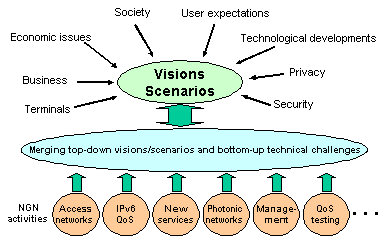

Next Generation Networks Roadmap 2002
Today only 5 per cent of the global society are on-line and have access to Internet services. It is a goal of the European Community to enable a much higher proportion of the global population to become active members in the information society. Besides political, economical, regulatory and human behaviour reasons, there are technical, and research and development issues which must be overcome on the way towards this goal. In January 2000, the European Community IST Research Programme launched the "Next Generation Network Initiative" (NGNi), a so-called "Thematic Network" project to resolve issues that create barriers to NGN deployment and to achieve interoperability, compatibility and/or commonality between NGN related projects within the IST Programme.
A big step forward in the direction of solving next generation network issues was achieved during the two NGNi meetings on 13 and 14 February in Brussels. The objective of the first day's meeting was co-ordination of the relevant IST projects (in the IST programme called "concertation"). This is a very important activity to achieve the maximum synergy between the IST projects involved in next generation networks matters. There is a large number of next generation network related IST projects; about 30 of them were either present or represented, enabling an important first step to be achieved towards good co-ordination. The broad areas in which the next generation network fields were structured were "Next generation IP protocols", "Network Management", "Fixed/mobile integration" and "Access networks".
The second day was the NGNi members meeting. The objective was to monitor the progress of the ongoing 6 NGNi activities, discuss 3 new proposed activities and agree on the way ahead.
The work performed in the NGNi project so far has concentrated on the technical challenges of specific network related areas. The instrument chosen for this are so-called "NGNi activities", short and small mini-projects funded within NGNi, which have the objectives of developing technology benchmarks, technology roadmaps and identifying required contributions to standards activities. NGNi activities have started on the following items:
Three new NGNi activities were proposed:
During the follow-up discussion it was realised that it is important to identify and collect the technical issues. But it was also accepted that this bottom-up view can only include a limited set of the most important items and can never provide the full picture. It would be impossible to lay the complete puzzle with this approach. Therefore a parallel top-down approach is required which looks at the issue from a much more general perspective.
To do this, an overall NGN vision and scenarios are needed. This vision and the scenarios should consistent with the broader vision of the information society, its constituent individuals, economic and market aspects. They should also take into account and explain the business motivations.
Between these two processes (bottom-up and top-down), the technical issues and challenges will merge with the developed visions and scenarios, and provide the required NGN roadmaps. It will be a challenging but also rewarding task to achieve a coherent framework including visions, scenarios, roadmaps and unsolved technical issues.

The results of NGNi will be used together with inputs coming from other sources as a guide to identify the European network related research issues of the next decade. It is important for the European Commission to put the available money on promising subjects and not to waste it by supporting activities that are not in line with future telecommunications trends. Both for defining the 6th Framework Programme and for creating a European Research Area we need concise roadmaps of the future information society and the related information and communication technologies. We need to clearly identify the items, which need urgent R&D measures to fill the gaps towards accepted ICT services. EURESCOM is heavily supporting this initiative and is ready to take an active role in defining Europe's way towards the information society.
More information about NGNi and the results achieved so far is available on their Web site at: http://www.ngni.org
All contents © by NGNI. Last Updated
For comments please contact webmaster